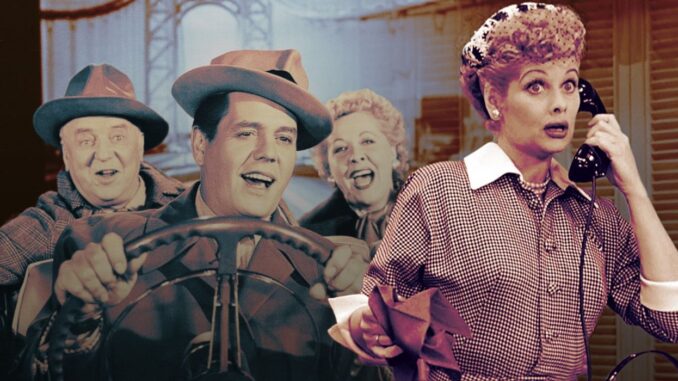
Why I Love Lucy Did Not Have a Proper Finale
Few shows have stood the test of time like I Love Lucy. With its timeless humor, lovable characters, and groundbreaking storytelling, it remains a fan favorite even decades after its final episode aired. But one question still looms large: why didn’t this iconic series have a proper finale? Let’s dive into the reasons, behind-the-scenes decisions, and lasting impact of this surprising choice.
The Rise of a Television Phenomenon
What Made I Love Lucy a Cultural Touchstone?
From its debut in 1951, I Love Lucy captivated audiences with its fresh approach to comedy. The dynamic between Lucy and Ricky Ricardo, played by real-life couple Lucille Ball and Desi Arnaz, created magic on screen. Add in their quirky neighbors Fred and Ethel Mertz, and you had a recipe for sitcom gold.
Breaking Boundaries in Television
The show wasn’t just funny—it was revolutionary. It was one of the first to feature a multiracial marriage, openly acknowledge pregnancy on screen, and use a three-camera setup in front of a live studio audience. The show was ahead of its time in so many ways, yet it lacked a definitive send-off.
The Abrupt Ending: What Happened?
Season 6: A Sudden Stop
The final episode of I Love Lucy aired on May 6, 1957, with little fanfare. Unlike today’s dramatic series finales, there was no closure for the characters or their stories. The Ricardos and Mertzes simply disappeared from viewers’ lives. But why?
A Shift in Format
By the time the sixth season ended, Lucille Ball and Desi Arnaz decided to transition the show into a new format. Instead of continuing as a weekly series, they created hour-long specials titled The Lucy-Desi Comedy Hour. These specials ran sporadically from 1957 to 1960 but didn’t provide the same serialized storytelling fans had come to love.
Behind-the-Scenes Reasons for the Lack of a Finale
Burnout Behind the Laughter
By the mid-1950s, Lucille Ball and Desi Arnaz were juggling enormous pressures. Not only were they the stars of the show, but they were also running Desilu Productions, one of the most influential studios of the time. This dual responsibility took a toll on their personal and professional lives.
Cracks in the Marriage
Behind the scenes, Ball and Arnaz’s marriage was struggling. Their off-screen conflicts sometimes spilled onto the set, creating tension. By 1960, the couple divorced, officially ending their professional partnership as well. This personal turmoil may have contributed to their decision to wind down the series without a formal finale.
Television Norms at the Time
Finales Weren’t a Standard Practice
In the 1950s, television finales weren’t the grand events they are today. Most shows ended without much fanfare, simply ceasing production when ratings dipped or contracts expired. The concept of a “series finale” as we know it didn’t become common until much later, with shows like The Mary Tyler Moore Show and MASH* setting the precedent.

The Legacy of I Love Lucy’s Ending
Did Fans Notice the Lack of Closure?
At the time, viewers may not have expected a dramatic send-off, but in hindsight, the lack of closure feels glaring. Lucy and Ricky’s story simply faded away, leaving fans to imagine what might have happened to their favorite TV couple.
The Impact of the Comedy Hour Specials
While The Lucy-Desi Comedy Hour provided new adventures for the Ricardos and Mertzes, it lacked the charm and consistency of the original series. Fans continued to cherish the classic episodes but longed for a more fitting farewell.
What If I Love Lucy Had a Finale?
Speculations on a Dream Ending
Imagine if I Love Lucy had ended with Lucy finally achieving her dream of stardom or the Ricardos settling down for a quieter life. Such an ending could have provided closure and celebrated the growth of these beloved characters.
Would a Finale Change Its Legacy?
Perhaps part of I Love Lucy’s enduring appeal lies in its unfinished nature. By leaving the story open-ended, the show allows fans to project their own ideas onto the characters’ futures.
Lessons Learned from I Love Lucy’s Ending
Evolving Expectations for TV Endings
The abrupt ending of I Love Lucy highlights how much television has evolved. Today, finales are often meticulously planned, aiming to leave a lasting impression on viewers.
A Reminder of Simpler Times
In many ways, the lack of a finale reflects the simpler storytelling of the era. The show focused on making people laugh, not crafting elaborate conclusions.
Why I Love Lucy Remains Timeless
The Power of Nostalgia
Despite its abrupt end, I Love Lucy remains a staple of television history. Its humor, heart, and relatability continue to resonate with audiences of all ages.
A Testament to Great Storytelling
Even without a finale, the show’s episodes stand on their own as timeless pieces of entertainment. Each one is a self-contained story that brings joy to millions.
Conclusion
The lack of a proper finale for I Love Lucy may leave fans with lingering questions, but it doesn’t diminish the show’s impact. Instead, it adds to its mystique, keeping the Ricardos and their antics alive in our imaginations. While we may never know what became of Lucy and Ricky, one thing is certain: their legacy will endure for generations to come.
FAQs
1. Why didn’t I Love Lucy have a finale?
The show transitioned to The Lucy-Desi Comedy Hour after its sixth season, and finales weren’t common practice at the time.
2. Did Lucille Ball and Desi Arnaz regret not having a proper ending?
Neither Ball nor Arnaz publicly expressed regret, but their focus was on new projects and managing their studio, Desilu Productions.
3. Were fans upset about the lack of closure?
At the time, fans accepted the transition to the comedy hour specials, but modern audiences often question the lack of a finale.
4. What happened to the Ricardos in The Lucy-Desi Comedy Hour?
The specials explored new adventures for the Ricardos and Mertzes, but they lacked the serialized charm of the original series.
5. How did I Love Lucy influence future sitcoms?
The show set the standard for sitcom storytelling, pioneering techniques like multi-camera filming and live audience recordings. Its influence is still felt in modern television.